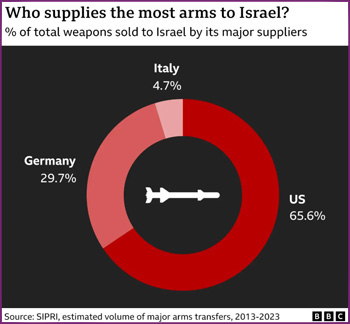International Affairs
 |
 |
 |
 |
 |
 |
 |
Germany Suspends Military Exports to Israel
- On Friday, Aug. 8, Germany announced the suspension of all military equipment exports to Israel that could be used in the Gaza Strip.
- The decision follows Israel’s approval of a proposal by Prime Minister Benjamin Netanyahu to expand military operations in Gaza, including plans to take control of Gaza City.
- Chancellor Friedrich Merz expressed deep concern over the intensified military actions in Gaza, which he believes hinder peace efforts. He emphasized the need for comprehensive humanitarian aid access and urged the Israeli government to avoid actions like annexing the West Bank, which could jeopardize the prospects for a two-state solution.
- The suspension marks a significant shift in Germany’s traditional role as one of Israel’s strongest allies. A recent poll indicates that a majority of Germans support increased pressure on Israel.

Merz expresses his dissatisfaction with Israel
Chancellor Friedrich Merz made the announcement in response to the escalating Israeli military operations and the deteriorating humanitarian situation in the Palestinian territory. The decision comes after Israel’s security cabinet approved a proposal by Prime Minister Benjamin Netanyahu to expand military operations in Gaza, including plans to take control of Gaza City.
The Israeli government asserts that this move is necessary to dismantle Hamas and secure the release of hostages. However, the plan has sparked international condemnation and protests within Israel, with hundreds gathering outside Netanyahu’s residence on Thursday evening, demanding an end to the war.
Merz expressed deep concern over the “even tougher military action by the Israeli army in the Gaza Strip,” which he believes complicates efforts to achieve peace and stability. “The humanitarian suffering in the Gaza Strip is ongoing and deeply concerning,” he stated.
While acknowledging Israel’s right to defend itself against Hamas, he emphasized the need for “comprehensive access for aid deliveries, including for United Nations organizations and other non-governmental institutions.” Merz also urged the Israeli government to refrain from annexing the West Bank, warning that such actions would undermine the prospects for a two-state solution. “No further steps should be taken that would make a two-state solution impossible,” he said.
Vice-Chancellor and Finance Minister Lars Klingbeil of the Social Democratic Party (SPD) echoed these sentiments, stating, “The humanitarian suffering in Gaza is unbearable. The Israeli government bears great responsibility for the humanitarian situation in Gaza.” Klingbeil emphasized the urgency of allowing humanitarian aid into Gaza and reiterated the importance of releasing all hostages and negotiating a ceasefire.
Germany’s special relationship with Israel
Germany’s decision marks a significant departure from its traditional role as one of Israel’s staunchest international allies. Historically, Berlin has maintained a “special relationship” with Tel Aviv, rooted in the aftermath of the Holocaust and the subsequent commitment to Israel’s security. This relationship has remained robust regardless of the governing political party in Germany.

Between Oct. 7, 2023 and May 13, Germany authorized weapons and military equipment exports to Israel worth €485.1 million ($565.2 million). This figure underscores the significant role Germany has played in supplying arms to Israel. The suspension of these exports is expected to have a substantial impact on Israel’s military capabilities in Gaza.
Germany’s move follows similar actions by other European countries, though it has not yet joined France and the United Kingdom in plans to formally recognize a Palestinian state. The German government has not specified which military equipment will be halted, but the announcement signals a shift in its approach to the conflict.
Read other articles by Belle Carter here
Posted August 13, 2025

______________________
______________________








